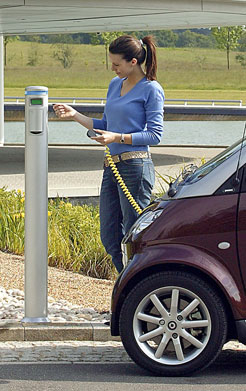
Dr Thomas Weber, Daimler’s head of research and development, files this special report on the future of electric cars
THE future for cars is electric. We will even have a version of our gullwing Mercedes SLS sports car shown at the Frankfurt Motor Show, with a range of around 150 miles.
However, achieving the performance of current petrol and diesel engined vehicles is still some way off.
Electric cars for city driving are just around the corner. And technology exists to run a car for up to 120 miles without a top up. But getting to twice or three times that is still some 20 years away.
Before we see full electric cars or fuel cell vehicles we need to establish infrastructures. Topping up batteries is straightforward if we charge vehicles slowly overnight. But we need to look at charging stations and how we can top batteries up in much shorter timescales and this requires investment to upgrade the grid. Similarly with hydrogen fuel cells we will need hydrogen filling stations.
We are working on ways to fully charge batteries within 30 minutes to 1 hour and hope to be able to achieve that within the next five years. This is important in terms of extending the range of an electric vehicles (EV). If you can charge fully in the time it takes for a coffee stop than this can make a big difference.
So while we at Mercedes continue to develop EVs through our tie-up with Telsa, makers of the electric sports car, we will continue to improve conventional petrol and diesel engines. And hybrid technology is the next development towards zero emission vehicles.
Hybrids are the next step
Hybrids offer great potential in terms of their flexibility. Hybrid technology has now been well-established by the Japanese makers. Pure electric vehicles are still constrained by range and there many issues still to address in terms of weight and cost.
In the meantime the internal combustion engine has a future. But it will become smaller and more efficient. There is no reason why we will not see small four-cylinder engines even in our luxury S-Class models. We continue to make advances in terms of power and torque thanks to turbocharging technology.
Stop-start on its way for Mercedes cars
We can also achieve fuel consumption reductions through transmissions. We will be able to reduce fuel consumption by 5-10% in a comparatively short space of time through using lighter materials and technologies such as double clutches on automatic transmissions. All Mercedes-Benz models will have access to stop-start technology – the roll out has already started. So while the cost-effective electric vehicle is still 20 years away, the potential to reduce emissions and improve fuel efficiency lies still with the conventional motor car.
Source for this special report: Headlineauto.







